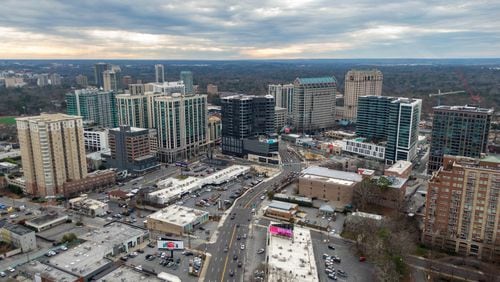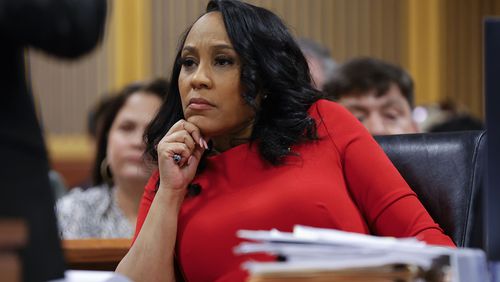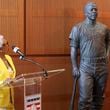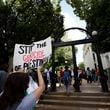A study paid for by supporters of the Buckhead cityhood movement has found the city would be financially viable, but critics say it doesn’t address the larger questions facing Atlanta.
Based strictly on the financials and barring any “social, political and governance issues,” the study commissioned by the Buckhead City Committee found that a new city could sport a $100 million surplus on its annual budget, thanks to its large tax base.
But the report doesn’t address the big question: How would the new city’s formation affect Atlanta’s budget and how would Atlanta handle the financial losses if Buckhead City were created?
Bill White, CEO and chair of the Buckhead City Committee, said that’s beside the point.
“The study is about Buckhead City, not Atlanta, but with a few publicly available numbers, the financial impact on the City of Atlanta is clear, and turns out to be very slight,” White said.
Jim Durrett, head of the Buckhead Coalition — an influential business group that has not favored the cityhood plan — said it’s clear to him the study started with a conclusion the city would be feasible and then came up with rationale.
“De-annexing part of a big city has never been done before and will set a dangerous precedent. Other neighborhoods in cities throughout Georgia may suddenly decide to break up key parts of their city,” Durrett said.
The feasibility study for Buckhead City, a copy of which was released to The Atlanta Journal-Constitution, is a required step in the state’s process for forming new cities. Proponents are aiming to pass the Buckhead cityhood bill during next year’s legislative session, which would allow Buckhead residents to vote on the idea on the November 2022 ballot.
Atlanta Councilman Howard Shook, who represents Buckhead, said he welcomed the study.
”If people are going to be asked to cast the most important vote in the history of Atlanta, they need to have answers to all of their financial questions,” he said.
Shook said he hopes the feasibility study addresses not just maintenance but also start-up costs for the city. “I don’t want to feel like I’m being pitched to buy a new car without saying how I’m going to pay for sticker price.”
The study does not address initial costs nor how to fund the potential prolonged legal battle. White said those costs were not supposed to be in this study and should be part of an upcoming review that he expects will be released in several months.
Valdosta State University’s Center for South Georgia Regional Impact conducted the study after several other large research centers that typically conduct cityhood feasibility studies declined, citing conflicts of interest with Atlanta.
Buckhead City proponents hope the study convinces state lawmakers to pass a bill next spring allowing Buckhead residents to vote on whether they want to break away from the city of Atlanta.
The proposal faces an uncertain path ahead in the Legislature, though several state senators have signed on in support of Buckhead City, including Gov. Brian Kemp’s floor leader.
The feasibility study estimated that Buckhead City would have just over 100,000 residents, and could take in annual revenues of about $203.5 million. More than half that — about $119 million — would come from property taxes, the study found. Buckhead accounts for about 20% of the city’s population, but about 40% of its assessed property values.
That $203 million accounts for about 10% of Atlanta’s overall budget.
Buckhead City would be home to about 103,000 residents throughout its roughly 25 square miles stretching from the divide of I-75 and I-85 on the southern end, to Atlanta’s northern and northwestern borders. It would equal 23.5% of Atlanta’s current land area, according to the study. The proposed city’s nearly 34,215 parcels amount to 22% of Atlanta’s current parcels.
Estimated yearly expenses, which include funding for new departments including police and fire as well as administrative expenses, came out to about $90 million — nearly a third of the city’s budget would go to policing, which is generally one of a government’s largest expenses.
The push for Buckhead cityhood largely stemmed from residents’ concerns over crime and frustration with the city for not taking stronger steps to address it.
“This is a warzone in Buckhead,” White said.
According to the study, a new Buckhead police department would need 175 patrol officers and 75 other sworn staff along with 18 administrative workers and 10 dispatchers.
White said the way to form a top-notch police force is to let officers do their jobs more freely — “we feel like the handcuffs are on the wrong people” — amid a nationwide reckoning about the role of police.
“We are going to have the highest-paid police officers in the state of Georgia,” he said. The plan is to pay officers $70,000 eventually. White said they are researching paying each cop a stipend between $2,500 and $8,500 to live within the city.
Critics, including Mayor Keisha Lance Bottoms, have said starting a new city is divisive and won’t necessarily reduce violent crime. They also worry it could leave the city of Atlanta in an impossible financial position, if so much commercial and residential tax revenue were taken away.
The assessed value of all the real estate in Atlanta currently totals nearly $35 billion, according to Fulton County Tax Assessor’s data. About 41% of that — over $14 billion — is in Buckhead, according to a data analysis performed by the AJC.
“It would be devastating to the city’s finances, residents, and the business community. Certainly a weaker Atlanta does not make a safer Buckhead,” Durrett said.
Buckhead City leaders say they still believe Atlanta wouldn’t be harmed financially, because losses of revenue would be partly offset by a reduction in expenses when it no longer has to provide services to Buckhead. Buckhead would continue to pay for Atlanta city services like water and sewer. But politics are rarely mentioned.
“There was no examination of the fallout of the political and social unrest that will take place if Buckhead breaks away from Atlanta,” Durrett said. “Businesses do not invest in uncertain, politically volatile environments.”
Local cityhood movements aren’t generally an issue in federal races, but Buckhead cityhood seeped into the U.S. Senate race.
Gary Black, one of four Republicans in the race against Democratic incumbent Raphael Warnock, held a press conference Monday outside the shopping plaza in Buckhead where a fatal shooting took place days earlier to endorse the cityhood referendum. He said he was stepping in because of rising crime rates.
“I’m going to be relentless on this issue. We must have a safer society,” he said. “It’s going to demand that all leaders join together to protect our citizens.”
White said he plans later this week to ask both chambers of the Georgia General Assembly for emergency hearings regarding the weekend shootings, hoping it shows legislators why the new city is needed.
“We’re not doing this to Atlanta,” he said. “Atlanta has done this to us.”
Staff writer Greg Bluestein contributed to this report.
Credit: WSBTV Videos








